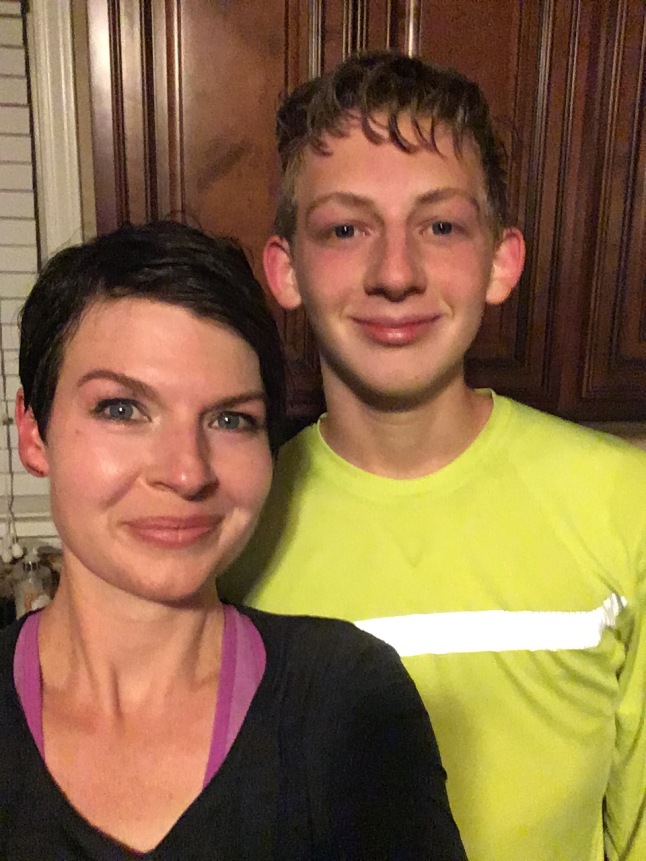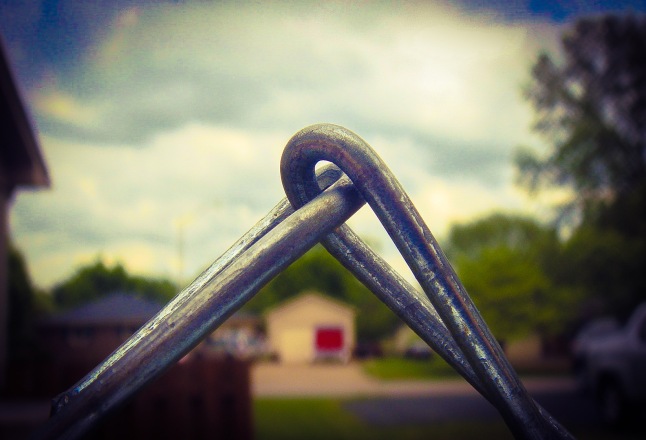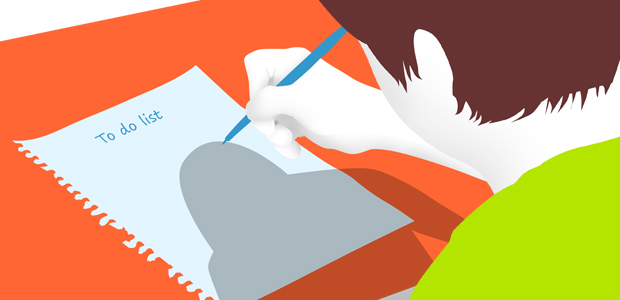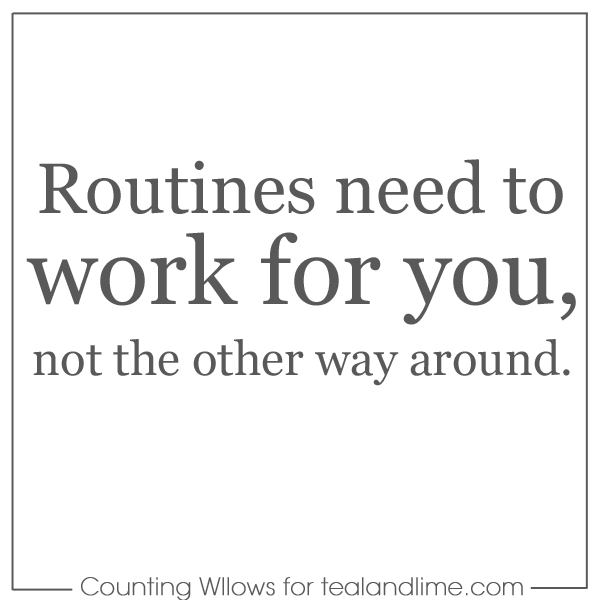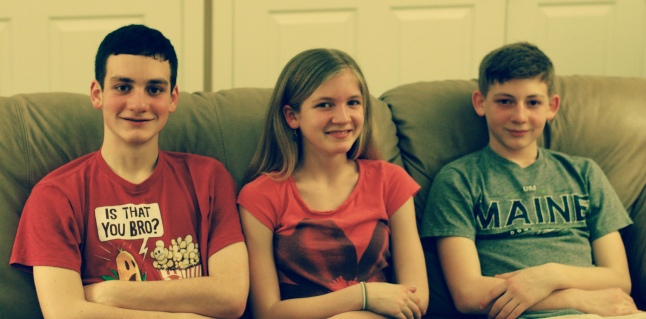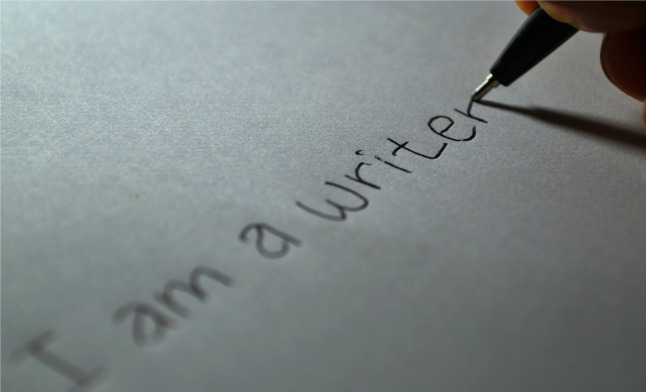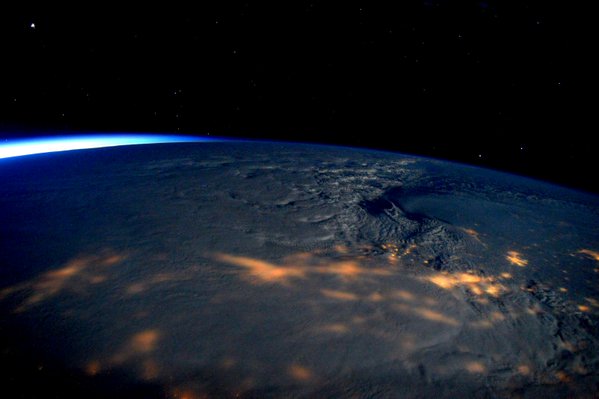The rain slanted hard on Friday night so that it found our faces as we huddled under a jerry-rigged pavilion. The last I’d checked it was 47 degrees and growing colder by the minute. My fifteen-year-old son and I jumped in place and clapped our hands like kids waiting for a parade, but we weren’t happy. We were steeling ourselves because, as soon as the other runners finished their tour of misery, we would toe the line and run a 10K on a night fit for short stories.
“Should we drop down to the 5K?” I said, leaping so I was temporarily eye-level with him.
“I don’t know. That guy said we could. Do you want to?”
“Do you?”
“I will if you will,” he said, breathing into his hands.
I watched raindrops disappear into the wig of a costumed bystander.
“No, I’m doing the 10. But you can do the five,” I said. “It’s completely fine.”
Before we were ready, someone announced our race. We drew our last dry breaths and headed into the night along with the other crazies. And we were off.
When I was a young mom, I knew what I’d do to raise my kids well. I had read parenting books, but, more than that, I’d watched women I admired raise “good” kids. I was going to have those kids, myself.
In my mind, good parenting started with breastfeeding, then getting the kids to sleep on a schedule, and progressed to offering pureed vegetables first, fruits later, etc. So I did those things. In fact, I did everything I could think of the right way, the way they said to. By the time my third baby came (32 months after the first), I was exhausted, and not just because I’d made three people in fewer than three years. I was exhausted from trying too hard. Also, I was unpleasant to be around.
I had never run a night race before last Friday. My son and I crushed that first mile like demons were after us. I wore my Garmin watch to help me pace myself, but I was paying too much attention to the people around me to heed it. Judging by the burning in my lungs, this was not a pace I could keep, but I did not slow down. My son hung with me, but he hadn’t trained like he should have, and I could tell he was going to have to dig deep to go the full 6.2 miles without slowing to a walk.
When my watch beeped at the end of that first mile, I found that I’d run a full minute faster than I needed to make my goal. Instead of feeling elated, I felt warned. Not sustainable.
If good parenting hadn’t included, in my mind, scrapbooking the kids’ early years, there is much I would not remember. It’s the one of the few things I still stand by all these years later–my commitment to commemorate. If I hadn’t taken all those pictures and arranged them with captions, I’d be left with mostly fuzzy impressions of my need for control and perfection. Not that we didn’t have story time and snuggles and trips to the sandbox. It’s just that those things weren’t enough to sustain a sense of peace in me.
By the end of our second mile, I was soaked through. My shoes hung on my feet like sodden bricks and my fingers burned. I’d slowed my pace, and it had helped, but I couldn’t stop rubber-necking to check on my son, who had drifted away from me. Were his cheeks red, was he gasping for breath, did he have blisters? Where was he, anyway?
“I’m getting blisters,” he said, appearing next to me out of nowhere. “I’m going to drop down to the 5K.”
“Ok, I will, too,” I said, feeling the energy draining out of my legs.
“No!” he said. “Please don’t, Mom. Please do the 10K. You trained.”
He was right. I had trained. But I wanted him to know that, after everything else faded away, he was more important to me than my goals.
“I don’t know,” I said. “It’s not a big deal…”
But then, a few minutes later, when the road forked, my son sprinted to the finish line and I took the curve without him.
My kids are teenagers now. They do not require the constant care they used to. They still act like toddlers sometimes, but now they want to take naps. I wish they wanted the occasional story time, but they don’t.
I had babies young, which means I’ll be an empty nester at 45. I know what’s coming. My kids will head for the finish line, and I’ll take the curve without them. I am sad and a little afraid as I imagine it.
Between miles 3 and 5, I stopped being tired. My legs churned like fleshy pistons, holding me up, sending me forward. I was alone on the road except for a husband and wife several feet in front of me. They splashed through inches of standing water that shimmered like a moonlit lake. I should have been lonely, but I wasn’t. I was euphoric.
Up ahead, I could see the finish line. Few people lined the path since–turns out–standing in the pouring rain, at night, in late October, is not everyone’s favorite. As I got closer, I saw my son running toward me, even wetter than before.
“Go faster, Mom,” he said, catching up to me. “You’re going to PR.”
I sprinted toward the finish line, my son running beside me. I sliced the air, faster than the speed of vomit, and made my goal by 53 seconds.
We both made it. Together.
